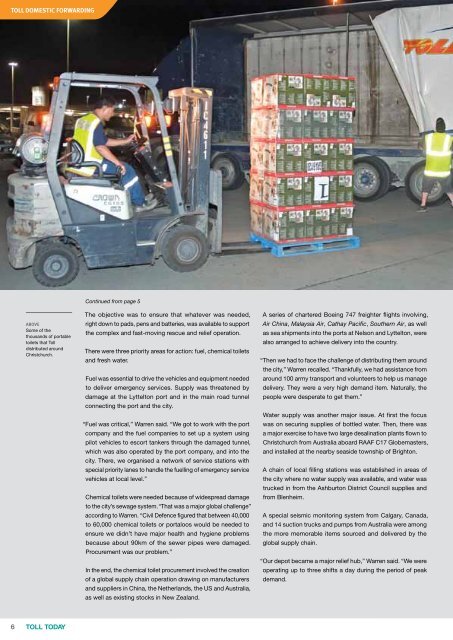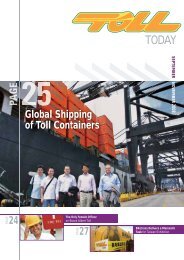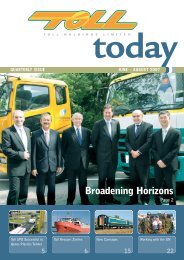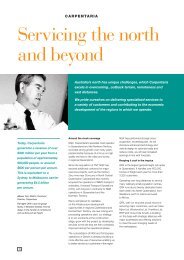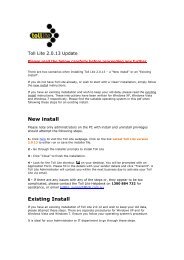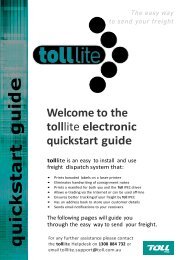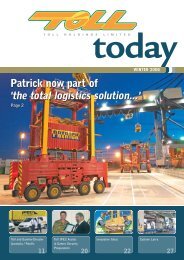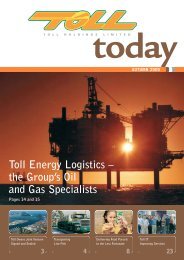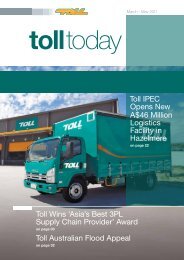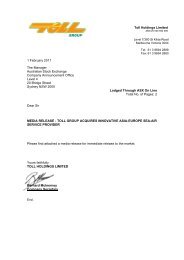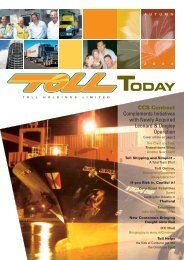Create successful ePaper yourself
Turn your PDF publications into a flip-book with our unique Google optimized e-Paper software.
<strong>TOLL</strong> DOMESTIC FORWARDInG<br />
AbOvE<br />
some of the<br />
thousands of portable<br />
toilets that <strong>Toll</strong><br />
distributed around<br />
Christchurch.<br />
6 tOLL tOdAY<br />
Continued from page 5<br />
The objective was to ensure that whatever was needed,<br />
right down to pads, pens and batteries, was available to support<br />
the complex and fast-moving rescue and relief operation.<br />
There were three priority areas for action: fuel, chemical toilets<br />
and fresh water.<br />
Fuel was essential to drive the vehicles and equipment needed<br />
to deliver emergency services. supply was threatened by<br />
damage at the lyttelton port and in the main road tunnel<br />
connecting the port and the city.<br />
“Fuel was critical,” Warren said. “We got to work with the port<br />
company and the fuel companies to set up a system using<br />
pilot vehicles to escort tankers through the damaged tunnel,<br />
which was also operated by the port company, and into the<br />
city. There, we organised a network of service stations with<br />
special priority lanes to handle the fuelling of emergency service<br />
vehicles at local level.”<br />
Chemical toilets were needed because of widespread damage<br />
to the city’s sewage system. “That was a major global challenge”<br />
according to Warren. “Civil Defence figured that between 40,000<br />
to 60,000 chemical toilets or portaloos would be needed to<br />
ensure we didn’t have major health and hygiene problems<br />
because about 90km of the sewer pipes were damaged.<br />
procurement was our problem.”<br />
in the end, the chemical toilet procurement involved the creation<br />
of a global supply chain operation drawing on manufacturers<br />
and suppliers in China, the netherlands, the us and australia,<br />
as well as existing stocks in new zealand.<br />
a series of chartered Boeing 747 freighter flights involving,<br />
Air China, Malaysia Air, Cathay Pacific, Southern Air, as well<br />
as sea shipments into the ports at nelson and lyttelton, were<br />
also arranged to achieve delivery into the country.<br />
“Then we had to face the challenge of distributing them around<br />
the city,” Warren recalled. “Thankfully, we had assistance from<br />
around 100 army transport and volunteers to help us manage<br />
delivery. They were a very high demand item. naturally, the<br />
people were desperate to get them.”<br />
Water supply was another major issue. at first the focus<br />
was on securing supplies of bottled water. Then, there was<br />
a major exercise to have two large desalination plants flown to<br />
Christchurch from australia aboard raaF C17 Globemasters,<br />
and installed at the nearby seaside township of Brighton.<br />
a chain of local filling stations was established in areas of<br />
the city where no water supply was available, and water was<br />
trucked in from the ashburton District Council supplies and<br />
from Blenheim.<br />
a special seismic monitoring system from Calgary, Canada,<br />
and 14 suction trucks and pumps from australia were among<br />
the more memorable items sourced and delivered by the<br />
global supply chain.<br />
“our depot became a major relief hub,” Warren said. “We were<br />
operating up to three shifts a day during the period of peak<br />
demand.


